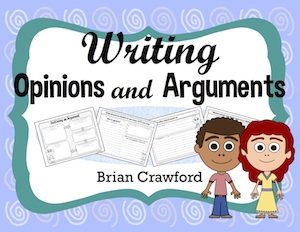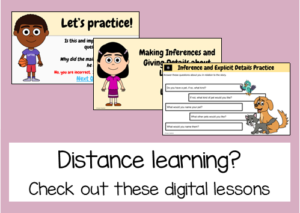 The Common Core State Standards (CCSS) places an emphasis on having students express their opinions in both speech and writing. For example, CCSS.W.1, the first Common Core writing standard for the first grade, reads: “Write arguments to support claims in an analysis of substantive topics or texts using valid reasoning and relevant and sufficient evidence.”
The Common Core State Standards (CCSS) places an emphasis on having students express their opinions in both speech and writing. For example, CCSS.W.1, the first Common Core writing standard for the first grade, reads: “Write arguments to support claims in an analysis of substantive topics or texts using valid reasoning and relevant and sufficient evidence.”
There are plenty of ways that you can have students express their opinions and offer arguments on certain topics in the classroom. You can:
- Have them write essays or short passages about their opinions based on a question that you pose to the class or to different work groups or centers in the classroom
- Stage a debate or discussion on a certain hot topic or current event
- Place “Agree” and “Disagree” signs in two different spots in the classroom (or simply write the words on a whiteboard or blackboard), then pose different definitive statements to the class and have them stand near the sign for “Agree” if they agree with the statement, and “Disagree” if they do not agree with the statement.
Here are a few tips to getting the best from your students when having them express their opinions or debate arguments:
Brainstorm different ideas
When making an argument, students should not simply run with whatever fact or opinion first pops into their head. They should think of different ways to express their opinions, and come up with multiple arguments to back up their declarations.
Look at both sides of the problem
In order to argue a position, students need to be able to understand the other side of the argument. They should research that other, differing side, and then work to come up with specific points that can help to refute those opposing arguments.
Keep a record of your sources for your facts
If you are going to state facts, you should know where the facts came from, which author can be attributed to which fact, and which sources contained each fact. Some sources are more credible than others – you should teach your students that facts found in credible academic journals may be more legitimate than facts found on Wikipedia (a crowd-sourced form of information gathering) or from the words of an actor or other celebrity who is simply stating his or her own opinion about something.
Speak or write eloquently, firmly
While the facts are king when debating, being able to speak and write fluently and eloquently can help you drive in your argument. Learning how to speak confidently and charismatically can make a big difference in a debate or discussion.
You can be personal, but do not take it personally
Everyone has personal opinions, and people can be have very strong emotional attachment to those opinions. When debating, do not take it personally when people refute your opinions or arguments. It can be difficult!
One last point: helping your students understand ethics and equality
One last point for teachers and educators – while you should let students have their opinions, be sure that opinions that may be racist, sexist, or immoral should be controlled. While people (students included) do have the right to free speech, you should work to help those students who may have racist or sexist opinions to understand why all humans should be treated with equal respect and understanding. This is a very important lesson to learn!
Writing Opinions and Arguments
 If you’re looking for fun prompts for students to use to express their opinions in the classroom, here is a packet of worksheets that you can have your students work on. Each worksheet prompts the students to think about their opinions and arguments in point form, and then write out an essay-style response to the opinion or argument. If students run out of room on the worksheet, they can can continue writing on a piece of lined paper or in their interactive reading or writing notebooks, if you use interactive notebooks as a teaching tool.
If you’re looking for fun prompts for students to use to express their opinions in the classroom, here is a packet of worksheets that you can have your students work on. Each worksheet prompts the students to think about their opinions and arguments in point form, and then write out an essay-style response to the opinion or argument. If students run out of room on the worksheet, they can can continue writing on a piece of lined paper or in their interactive reading or writing notebooks, if you use interactive notebooks as a teaching tool.
Writing opinions and arguments can be a lot of fun! I hope your students enjoy learning how to express their opinions and to debate hot topic arguments on both sides.
If you have any opinions of your own about how best to teach students to express themselves, I’d be glad to hear them! Please feel free to leave a comment below.



